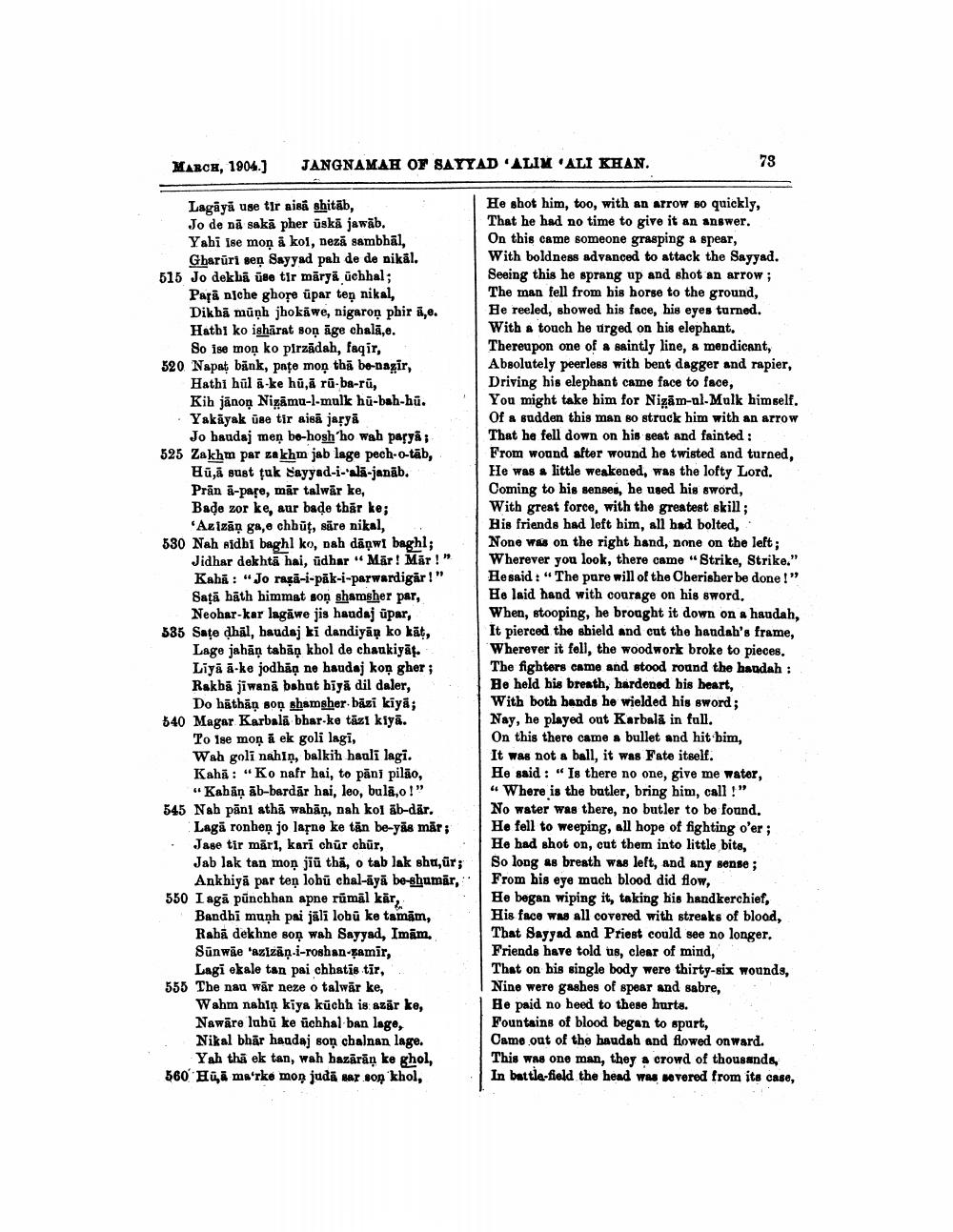________________
JANGNAMAH OF SAYYAD ALIM ALI KHAN.
MARCH, 1904.]
Lagaya use tir aisa shitāb,
Jo de na sakā pher ūskā jawab. Yahi ise mon & kol, neză sambhal, Gharuri sen Sayyad pah de de nikäl. 515 Jo dekha use tir marya uchhal;
Para niche ghore upar ten nikal, Dikhā mūņh jhokawe, nigaron phir ā,e. Hathi ko isharat son age chala,e. So ise mon ko pirzadah, faqir,
520 Napat bank, pate mon tha be-nazir, Hathi hul ā-ke hū,ā rū-ba-rū,
Kih janon Nizamu-l-mulk hu-bah-hu. Yakayak use tir aisā jaṛyā
Jo haudaj men be-hosh'ho wah parya; 525 Zakhm par zakhm jab lage pech-o-tab,
Hu,a sust tuk Sayyad-i-ala-janāb. Pran ā-pare, mar talwar ke,
Bade zor ke, aur bade thar ke; 'Azizan ga,e chhūt, săre nikal, 530 Nah sidhi baghl ko, nah danwi baghl; Jidhar dekhta hai, üdhar " Mär! Mär!" Kaha: "Jo raga-i-pak-i-parwardigar!" Sata hath himmat son shamsher par, Neohar-kar lagawe jis haudaj upar, 535 Sate dhal, haudaj ki dandiyan ko kāt, Lage jahan tahap khol de chaukiyat. Liyā ā-ke jodhan ne haudaj kon gher; Rakbā jiwanā bahut biya dil daler, Do hathan son shamsher bāzi kiyā; 540 Magar Karbala bhar-ke täzi kiya. To ise mon a ek goli lagi, Wah goli nahin, balkih hauli lagi. Kaha: "Ko nafr hai, to pani pilão, "Kahan ab-bardar hai, leo, bula,o!" 545 Nah pani atha wahan, nah kol äb-där.
Lagā ronhen jo larne ke tan be-yas mār; Jase tir māri, kari chur chur,
Jab lak tan mon jiu tha, o tab lak shu,ür; Ankhiya par ten lohu chal-aya be-shumar, 550 I agā punchhan apne rūmāl kār
Bandhi munh pai jālī lobu ke tamām, Rabā dekhne son wah Sayyad, Imam, Sunwãe 'azizan-i-roshan-zamir, Lagi ekale tan pai chhatis tīr, 555 The nau war neze o talwar ke,
Wahm nahin kiya kuchh is azar ke, Naware lubu ke uchhal ban lage, Nikal bhar haudaj son chalnan lage. Yah tha ek tan, wah hazaran ke ghol, 560 Hu,a ma'rke mon juda sar son khol,
78
He shot him, too, with an arrow so quickly, That he had no time to give it an answer. On this came someone grasping a spear, With boldness advanced to attack the Sayyad. Seeing this he sprang up and shot an arrow; The man fell from his horse to the ground, He reeled, showed his face, his eyes turned. With a touch he urged on his elephant. Thereupon one of a saintly line, a mendicant, Absolutely peerless with bent dagger and rapier, Driving his elephant came face to face, You might take him for Nizam-ul-Mulk himself. Of a sudden this man so struck him with an arrow That he fell down on his seat and fainted: From wound after wound he twisted and turned, He was a little weakened, was the lofty Lord. Coming to his senses, he used his sword, With great force, with the greatest skill; His friends had left him, all had bolted, None was on the right hand, none on the left; Wherever you look, there came "Strike, Strike." He said: "The pure will of the Cherisher be done!" He laid hand with courage on his sword. When, stooping, he brought it down on a haudah, It pierced the shield and cut the handah's frame, Wherever it fell, the woodwork broke to pieces. The fighters came and stood round the haudah : He held his breath, hardened his heart, With both hands he wielded his sword; Nay, he played out Karbala in full. On this there came a bullet and hit him, It was not a ball, it was Fate itself. He said: "Is there no one, give me water, "Where is the butler, bring him, call!" No water was there, no butler to be found. He fell to weeping, all hope of fighting o'er ; He had shot on, cut them into little bits, So long as breath was left, and any sense; From his eye much blood did flow, He began wiping it, taking his handkerchief, His face was all covered with streaks of blood, That Sayyad and Priest could see no longer. Friends have told us, clear of mind,
That on his single body were thirty-six wounds, Nine were gashes of spear and sabre, He paid no heed to these hurts. Fountains of blood began to spurt, Came out of the haudah and flowed onward. This was one man, they a crowd of thousands, In battle-field the head was severed from its case,




